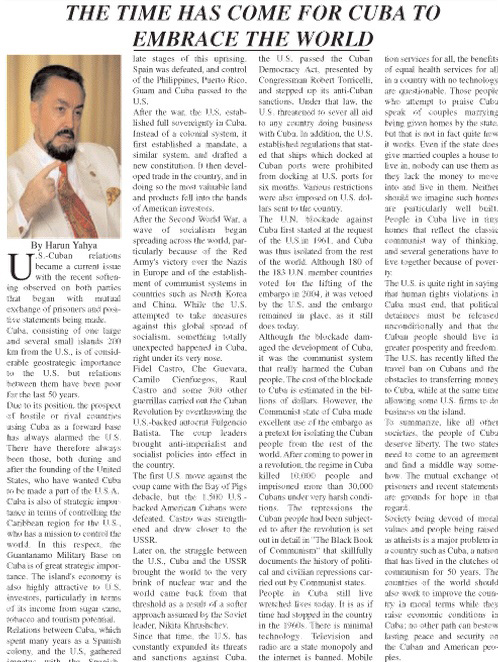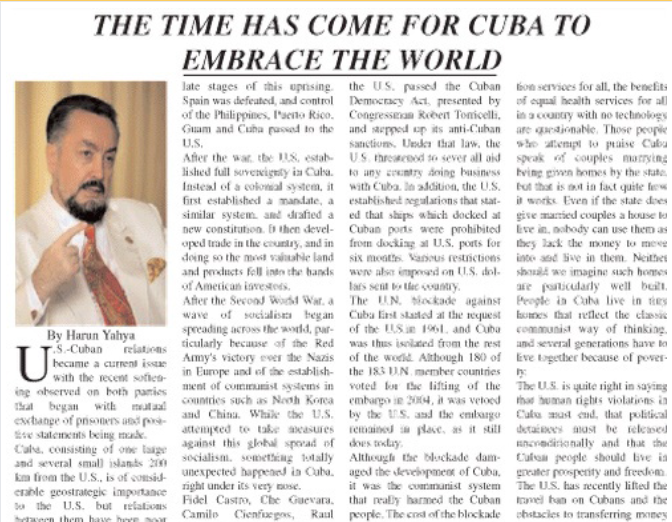
U.S.-Cuban relations became a current issue with the recent softening observed on both parties that began with mutual exchange of prisoners and positive statements being made.
Cuba, consisting of one large and several small islands 200 km from the U.S., is of considerable geostrategic importance to the U.S. but relations between them have been poor for the last 50 years.
Due to its position, the prospect of hostile or rival countries using Cuba as a forward base has always alarmed the U.S. There have therefore always been those, both during and after the founding of the United States, who have wanted Cuba to be made a part of the U.S.A.
Cuba is also of strategic importance in terms of controlling the Caribbean region for the U.S., who has a mission to control the world. In this respect, the Guantanamo Military Base on Cuba is of great strategic importance. The island’s economy is also highly attractive to U.S. investors, particularly in terms of its income from sugar cane, tobacco and tourism potential.
Relations between Cuba, which spent many years as a Spanish colony, and the U.S, gathered impetus with the Spanish-American War of 1898. The Cubans were repressed and unhappy under Spanish rule and they therefore rebelled. The U.S. intervened in the war on the side of the Cubans in the late stages of this uprising. Spain was defeated, and control of the Philippines, Puerto Rico, Guam and Cuba passed to the U.S.
After the war, the U.S. established full sovereignty in Cuba. Instead of a colonial system, it first established a mandate, a similar system, and drafted a new constitution. It then developed trade in the country, and in doing so the most valuable land and products fell into the hands of American investors.
After the Second World War, a wave of socialism began spreading across the world, particularly because of the Red Army’s victory over the Nazis in Europe and of the establishment of communist systems in countries such as North Korea and China. While the U.S. attempted to take measures against this global spread of socialism, something totally unexpected happened in Cuba, right under its very nose.
Fidel Castro, Che Guevara, Camilo Cienfuegos, Raul Castro and some 300 other guerrillas carried out the Cuban Revolution by overthrowing the U.S.-backed autocrat Fulgencio Batista. The coup leaders brought anti-imperialist and socialist policies into effect in the country.
The first U.S. move against the coup came with the Bay of Pigs debacle, but the 1,500 U.S.-backed American Cubans were defeated. Castro was strengthened and drew closer to the USSR.
Later on, the struggle between the U.S., Cuba and the USSR brought the world to the very brink of nuclear war and the world came back from that threshold as a result of a softer approach assumed by the Soviet leader, Nikita Khrushchev.
Since that time, the U.S. has constantly expanded its threats and sanctions against Cuba. Although the situation in Cuba, which survived through USSR support, was not pleasant right from the outset, its real problems began with the demise of the USSR in late 1992.
With the collapse of the USSR, the U.S. passed the Cuban Democracy Act, presented by Congressman Robert Torricelli, and stepped up its anti-Cuban sanctions. Under that law, the U.S. threatened to sever all aid to any country doing business with Cuba. In addition, the U.S. established regulations that stated that ships which docked at Cuban ports were prohibited from docking at U.S. ports for six months. Various restrictions were also imposed on U.S. dollars sent to the country.
The U.N. blockade against Cuba first started at the request of the U.S.in 1961, and Cuba was thus isolated from the rest of the world. Although 180 of the 183 U.N. member countries voted for the lifting of the embargo in 2004, it was vetoed by the U.S. and the embargo remained in place, as it still does today.
Although the blockade damaged the development of Cuba, it was the communist system that really harmed the Cuban people. The cost of the blockade to Cuba is estimated in the billions of dollars. However, the Communist state of Cuba made excellent use of the embargo as a pretext for isolating the Cuban people from the rest of the world. After coming to power in a revolution, the regime in Cuba killed 10,000 people and imprisoned more than 30,000 Cubans under very harsh conditions. The repressions the Cuban people had been subjected to after the revolution is set out in detail in “The Black Book of Communism” that skillfully documents the history of political and civilian repressions carried out by Communist states.
People in Cuba still live wretched lives today. It is as if time had stopped in the country in the 1960s. There is minimal technology. Television and radio are a state monopoly and the internet is banned. Mobile phones are quite rare. Until Raul Castro came to power, Cubans were not allowed to travel abroad except for business purposes.
Although the state claims to provide equal health and education services for all, the benefits of equal health services for all in a country with no technology are questionable. Those people who attempt to praise Cuba speak of couples marrying being given homes by the state, but that is not in fact quite how it works. Even if the state does give married couples a house to live in, nobody can use them as they lack the money to move into and live in them. Neither should we imagine such homes are particularly well built. People in Cuba live in tiny homes that reflect the classic communist way of thinking, and several generations have to live together because of poverty.
The U.S. is quite right in saying that human rights violations in Cuba must end, that political detainees must be released unconditionally and that the Cuban people should live in greater prosperity and freedom.
The U.S. has recently lifted the travel ban on Cubans and the obstacles to transferring money to Cuba, while at the same time allowing some U.S. firms to do business on the island.
To summarize, like all other societies, the people of Cuba deserve liberty. The two states need to come to an agreement and find a middle way somehow. The mutual exchange of prisoners and recent statements are grounds for hope in that regard.
Society being devoid of moral values and people being raised as atheists is a major problem in a country such as Cuba, a nation that has lived in the clutches of communism for 50 years. The countries of the world should also work to improve the country in moral terms while they raise economic conditions in Cuba; no other path can bestow lasting peace and security on the Cuban and American peoples.
Adnan Oktar's piece on Urdu Times


